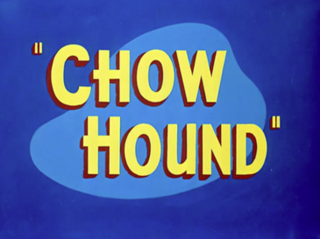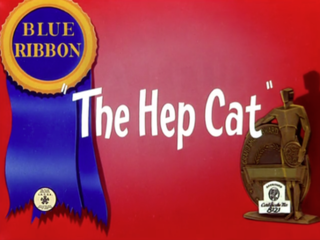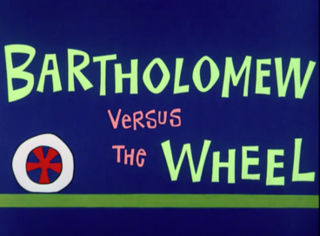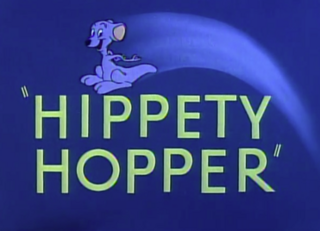Charlie Dog is an animated cartoon character in the Warner Brothers Looney Tunes series of cartoons. The character was featured in nine cartoons between 1941 and 1958. He is generally characterized as a friendly wise guy.

Tweetie Pie is a 1947 Warner Bros. Merrie Melodies cartoon directed by Friz Freleng. The short was released on May 3, 1947, and stars Tweety with Sylvester, who is called "Thomas" in this cartoon.

Babbit and Catstello are fictional characters, based on the comedic duo Abbott and Costello, that appeared in Warner Bros. animated cartoons. The characters appeared in four cartoons between 1942 and 1946: once as cats, once as dogs, and twice as mice.

Dog Pounded is a 1954 Warner Bros. Looney Tunes animated cartoon short directed by Friz Freleng. The short was released on January 2, 1954, and stars Tweety and Sylvester. The voices were performed by Mel Blanc. The title is a play on the phrase dog pound.
Hop, Look and Listen is a 1948 Warner Bros. Looney Tunes cartoon directed by Robert McKimson. The short was released on April 17, 1948, and stars Sylvester and Hippety Hopper, in the latter's first appearance.

An Itch in Time is a 1943 Warner Bros. Merrie Melodies cartoon, directed by Bob Clampett. The short was released on December 4, 1943 and features Elmer Fudd, with a dog and cat that look similar to Willoughby and Claude Cat.

I Taw a Putty Tat is a 1948 Warner Bros. Merrie Melodies animated cartoon directed by Friz Freleng. The short was released on April 1, 1948, and stars Tweety and Sylvester.

Cheese Chasers is a 1951 Warner Bros. Merrie Melodies cartoon directed by Chuck Jones and written by Michael Maltese. The cartoon was released on August 25, 1951 and stars Hubie and Bertie, with Claude Cat.

The Foghorn Leghorn is a 1948 Warner Bros. Merrie Melodies cartoon directed by Robert McKimson. The cartoon was released on October 9, 1948, and features Foghorn Leghorn, Henery Hawk and the Barnyard Dawg.

Early to Bet is a 1951 Warner Bros. Merrie Melodies theatrical cartoon short directed by Robert McKimson. The short was released on May 12, 1951, and features the Gambling Bug.

Chow Hound is a 1951 Warner Bros. Looney Tunes animated short directed by Chuck Jones and written by Michael Maltese. The short was released on June 16, 1951. The voices are performed by Mel Blanc, Bea Benaderet and John T. Smith.

The Hep Cat is a 1942 Warner Bros. Looney Tunes cartoon directed by Bob Clampett, written by Warren Foster, animated primarily by Robert McKimson, and set to a musical score composed by Carl W. Stalling. The short was released on October 3, 1942. This cartoon was the first Technicolor Looney Tunes short.
This is a listing of all the animated shorts released by Warner Bros. under the Looney Tunes and Merrie Melodies banners between 1960 and 1969. A total of 147 shorts were released during the 1960s.
A Bird in a Bonnet is a 1958 Warner Bros. Merrie Melodies animated short directed by Friz Freleng. The voices were performed by Mel Blanc, Daws Butler and June Foray. The short was released on September 27, 1958, and stars Tweety and Sylvester.
Peck Up Your Troubles is a 1945 Warner Bros. Merrie Melodies animated short directed by Friz Freleng. The short was released on October 20, 1945, and stars Sylvester the Cat.

Birdy and the Beast is a 1944 Warner Bros. Merrie Melodies directed by Bob Clampett. The short was released on August 19, 1944, and stars Tweety.

Bartholomew Versus the Wheel is a 1964 Warner Bros. Merrie Melodies cartoon directed by Robert McKimson. It was released theatrically on February 29, 1964.

Hippety Hopper is a Warner Bros. Merrie Melodies cartoon directed by Robert McKimson and written by Warren Foster. The short was released on November 19, 1949, and stars Sylvester and Hippety Hopper.

Fox-Terror is a 1957 Warner Bros. Merrie Melodies animated short directed by Robert McKimson. The cartoon was released on May 11, 1957, and features Foghorn Leghorn and the Barnyard Dawg. The title is a play on the dog breed name "Fox Terrier".














